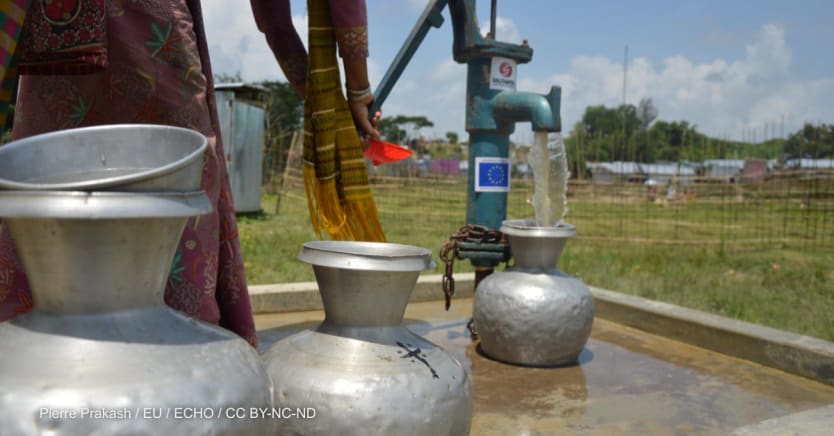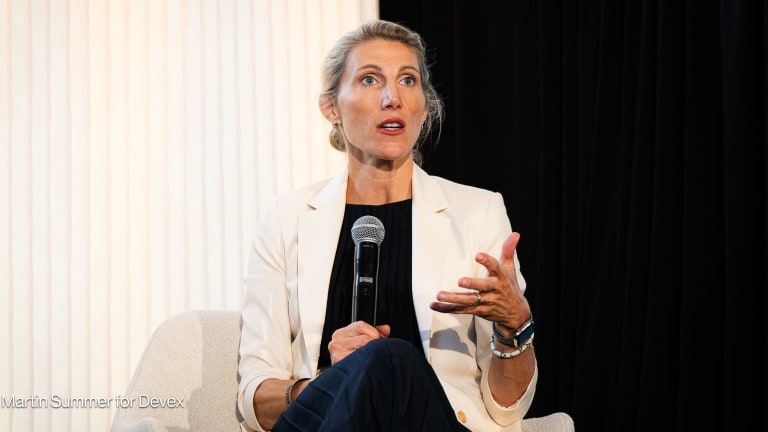
The data is unequivocal. The climate is changing and we’re seeing the effects around the world. These changes pose particular risks to global water supply and sanitation systems. Humanity must take immediate action to reverse these trends. But we must also begin preparing — and investing — in the infrastructure required to mitigate its impacts before they, too, become foregone conclusions.
When it comes to water, climate change is a phenomenon of extremes: too much or too little can be devastating.
Too little water makes families choose between hygiene and hydration. Crops suffer and food production declines, exacerbating the vicious cycle of malnutrition and increased vulnerability to infections.
Meanwhile, too much water quickly overwhelms deteriorating or nonexistent water and sanitation systems, making it nearly impossible to find safe drinking water. Waterborne infectious diseases thrive in such settings, especially in crowded, informal settlements where disease can spread rapidly.
These scenarios are already playing out for many communities. Rohingya refugee settlements in coastal Bangladesh are beset with monsoons, flooding, and cholera. As global temperatures rise, it could get worse. It’s estimated that every 1 degree Celsius increase can result in a 7% increase in diarrhea cases.
By 2030, we could see 50,000 additional childhood diarrhea deaths annually. This is on top of the approximately half a million children who already die from diarrhea each year.
Like the burden of infectious disease, climate-related health risks will reflect — and exacerbate — existing inequities within and among nations. Those least responsible for climate change are already paying the highest price of global carbon emissions. And those who already lack access to lifesaving water and sanitation will see the largest increases in climate-linked waterborne disease.
Unfortunately, women and girls stand to suffer most. When women don’t have a private place to relieve themselves, when they have to travel long distances for clean drinking water, or when they deliver babies in facilities without running water, their lives and health are at risk.
It’s thus no surprise that women are among the strongest community champions for access to better water, sanitation, and hygiene resources — they know what it will mean for them, their children, and their communities. In many communities, and for many leaders, this means advocating for greater access to water and sanitation, including more, and better, toilets.
It’s well known that toilets can improve sanitation by protecting communities from fecal pathogens and reducing the spread of disease. However, “gold standard” sewered sanitation systems found at scale in high-income countries are costly, inflexible, and waste large amounts of water.
But these kinds of toilets are not the only option anymore.
There are many safe, sustainable models that are affordable and user-centered. Furthermore, these new models hold enormous untapped potential for a more sustainable way of living. They can create jobs, repurpose waste as resources such as fertilizer or energy, and impart the dignity we all deserve — the ability to safely and hygienically go.
One approach to nonsewered sanitation in Nairobi has so far created more than 2,000 jobs and offset 50,000 tons of harmful carbon emissions through its circular sanitation model, upcycling waste gathered from latrines to resources such as fertilizer and biofuel.
Investment in sustainable sanitation is an investment in our climate too.
—In Haiti, compost generated from a container-based toilet model is supporting reforestation and climate change mitigation efforts. Other models have successfully encouraged reusing gray water — the excess water from activities such as dishwashing — to flush toilets, an efficient water-saving measure.
Around the world, access remains the biggest sanitation challenge. Safe drinking water, sanitation, and hygiene could prevent 300,000 child deaths from diarrhea per year. It’s a grave injustice that these basic, lifesaving tools remain out of reach for billions of people.
The time for investment and innovation is now. For many people, the only thing standing in the way of universal access to sanitation is the political will to invest in it. Decision-makers at all levels must invest in existing sanitation solutions, while also continuing to innovate, and advance the availability of context-specific, user-centered, and climate-resilient sanitation solutions.
There may be more than one billion climate refugees by the middle of the century. Experts predict more and more families will flee rural communities when unpredictable weather patterns harm crop yield and thus their livelihoods, sending them to urban areas in search of better opportunities. Housing insecurity in urban settings will increase, making nimble, adaptive sanitation solutions even more critical to prevent outbreaks of infectious disease.
Ultimately, investment in sustainable sanitation is an investment in our climate too. Only programs and funding that harness these synergies will be truly effective. Toilets may not be top of mind as a fortification against global health threats, but we can’t afford for them not to be. They are a basic component of building back better toward a resilient, adaptive future.









